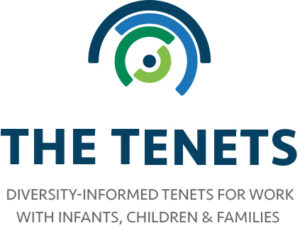About Infant Mental Health
During the first five years of life, children develop a fundamental sense of themselves and their worlds. As they learn to experience, express and regulate emotions, form close relationships, and explore and learn from the environment, we say they are thriving according to the principles of infant and early childhood mental health.
These principles promote diversity-informed practice across research, clinical work, and policy to provide caregivers and babies the best possible start.
The goals of the Barnard Center are to:
- Advance knowledge about infant and early childhood mental health and the centrality of early relationships to the healthy development of children;
- Promote collaborative university-community partnerships for infant and early childhood mental health education and training, advocacy, and clinical research;
- Offer educational opportunities in infant and early childhood mental health;
- Promote the health of young children and their families through effective preventive approaches to children’s emotional, social and behavioral problems;
- Conduct longitudinal and clinical research to increase our understanding of the development of children in the context of adversity and effective community and family intervention efforts on their behalf.
The mission of the Barnard Center for Infant and Early Childhood Mental Health is to promote interdisciplinary research and training related to infant and early childhood mental health. During the first five years, as children learn to experience, express and regulate emotions, form close relationships, and explore and learn from the environment, we say they are thriving according to the principles of infant and early childhood mental health.
The Barnard Center embodies the vision of the late Kathryn E. Barnard, PhD, FAAN. Barnard was an international pioneer in the field of infant mental health. Barnard founded the Center on Infant Mental Health and Development in collaboration with the University of Washington School of Nursing and the Center on Human Development and Disability as a multidisciplinary resource for research and training. The center was renamed in her honor in 2012.
With the support of generous donors, the Barnard Center opened in 2001 with a five-year plan to increase the number of professionals trained to provide therapeutic support for parents and infants in the state of Washington. From 2001 to 2006, the Barnard Center trained 38 Seattle-area professionals, giving a significant boost to the field. A redesigned graduate certificate program started in 2009 graduates eight to 12 students annually until 2017. In 2020 the program underwent a redesign and will be delivered as a community professional development program called the Advanced Clinical Training (ACT). This program is led by Dr. Nucha Isarowong and will launch in March of 2021.
In addition to the Barnard Center, Dr. Kathryn Barnard also founded the Parent-Child Relationship Programs (PCRP) at the Barnard Center (formerly known as NCAST Programs). PCRP is the development and dissemination unit at the Barnard Center. Our mission is to provide the tools and training necessary to support professionals in their work of supporting parents with young children. PCRP was founded in 1976 and continues to train 1000’s of professionals across the globe each year.
Dr. Kathryn Barnard passed away in 2015, leaving a legacy for others to build on in infant and early childhood development. As one of the earliest translational scientists, Dr. Barnard forged partnerships across the globe that enabled the dissemination of innovative, research-based tools and programs that support community nurses and social workers’ important work. The School of Nursing recognized her contributions in a short video on her legacy and her huge impact on the field of Infant and Early Childhood Mental Health.
The Barnard Center for Infant and Early Childhood Mental Health supports the professional development of interdisciplinary infant and early childhood practitioners and conducts research related to infant and early childhood mental health. It consists of three divisions:
- Research: The center has secured over 20 million dollars of funding from the National Institutes of Health in research funding in the past 10 years. One of the primary aims of our recent research is to conduct randomized clinical trials on home visiting programs to test their effectiveness in diverse populations of caregivers and children.
- Dissemination: Parent-Child Relationship Programs @ the Barnard Center is now formally part of the Barnard Center and operates as the center’s dissemination arm.
- Workforce development: As the go-to resource for workforce development and training, the center serves those professionals who work with families every day and provide services to support the care and well-being of young children.

The Barnard Center endorses “The Tenets”. The Diversity-Informed Tenets for Work with Infants, Children and Families (Tenets) are a set of guiding principles and practices that strengthen the commitment and capacity of professionals, organizations and systems to embed diversity, inclusion and equity principles into their work with infants, children and families.
The Tenets help programs, organizations and systems of care benchmark their progress in embedding diversity, equity and inclusion into every aspect of individual and organizational practices and policies. They help launch the beginning of an ongoing, always-evolving conversation, about creating a more diverse, inclusive and equitable organization.
IMH Messaging Flyers
Please find in this section IMH Messaging flyers for print or for digital dissemination. Feel fee to download these flyers and share with your community.
Download the flyers
- Behavioral health providers: digital | printable
- Child welfare providers: digital| printable
- Early learning providers: digital | printable
- Health care providers: digital | printable
